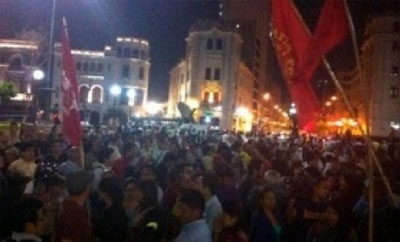A court in Peru has annulled reports from a parliamentary commission calling for the indictment of ex-President Alan Garcia over links to a “narco-pardons” scandal, sparking protests and spats about this highly politicized corruption case.
The Fifth Constitutional Court of Lima made the decision on March 31 based on an infringement of Garcia’s rights of defense, reported La Republica. Politician Enrique Wong, who sat on the “mega-commission” that investigated Garcia, told Peru21 the legal issue stemmed from the commission’s failure to inform the ex-president last year of whether he was being asked to appear as a witness or a suspect.
SEE ALSO: Peru News and Profiles
The decision caused public outcry, with protests staged in Lima’s Plaza San Martin. It also sparked a spat between Garcia and current President Ollanta Humala, after the latter criticized Garcia and said he “should not try to sneak away from an investigation” if he had nothing to hide. Garcia responded by accusing Humala of supporting the commission for political motives.
In the aftermath of the ruling, commission head Sergio Tejada announced plans to appeal the decision.
With the commission formally dissolved after issuing its final report in January, an entirely new one would have to be assembled to begin the investigation from scratch, should the case against Garcia be pursued once more.
InSight Crime Analysis
The mega-commission was originally approved in 2011 to investigate alleged unconstitutional and corrupt acts by Garcia during his second term as president between 2006 and 2011. The investigation resulted in accusations that Garcia freed 400 drug traffickers in a so-called “pay-for-pardons” scandal.
While Garcia claimed they were low-level traffickers released to relieve pressure on the prison system, evidence suggested some were much more important as the commission’s investigation gained traction in late 2013. In December, the commission declared Garcia had committed “constitutional infractions” and in the final January report, it called for Garcia’s indictment to face criminal charges.
His possible escape from such a fate on a legal technicality, should the appeal prove fruitless, will be a bitter blow to his opponents, who will see it as further evidence of Garcia’s power to escape prosecution, a pattern common among Peru’s political elites.
However, Garcia’s accusation that the investigation against him is politically motivated could also hold some truth, particularly as reports have widely speculated he is gearing up to run for a third presidential term in the country’s 2016 general election.

